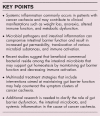Gut barrier dysfunction and microbial translocation in cancer cachexia: a new therapeutic target
- PMID: 24157715
- PMCID: PMC3819310
- DOI: 10.1097/SPC.0000000000000017
Gut barrier dysfunction and microbial translocation in cancer cachexia: a new therapeutic target
Abstract
Purpose of review: Cachexia is a complex metabolic syndrome characterized by skeletal muscle and adipose tissue loss and is frequently associated with emaciation, anorexia, systemic inflammation, and metabolic dysfunction. Lack of a clear understanding of the cause of cancer cachexia has impeded progress in identifying effective therapeutic agents. This review summarizes recent publications on the role of gut barrier function, intestinal microbiota, and inflammation in the etiology of cancer cachexia and new therapeutic interventions that may benefit treatment strategies.
Recent findings: Significant advances have been made in understanding the composition and metabolic capabilities of the intestinal microbiota and its impact on gut barrier function with implications for certain inflammatory-based diseases. Recent studies reported associations between intestinal permeability and endotoxemia with development of cancer cachexia and other metabolic disorders. Improvements in intestinal function and weight gain along with decreased inflammation have been reported for potential therapeutic agents such as eicosapentaenoic acid, immunoglobulin isolates, and probiotics.
Summary: Continued progress in the scientific understanding of the complex interplay between the intestinal microbiota, gut barrier function, and host inflammatory responses will uncover new therapeutic targets to help avoid the serious metabolic alterations associated with cachexia.
References
-
- Evans WJ, Morley JE, Argiles J, et al. Cachexia: a new definition. Clin Nutr 2008; 27:793–799 - PubMed
-
- Jatoi A. Weight loss in patients with advanced cancer: effects, causes, and potential management. Curr Opin Support Palliat Care 2008; 2:45–48 - PubMed
-
- Utech AE, Tadros EM, Hayes TG, Garcia JM. Predicting survival in cancer patients: the role of cachexia and hormonal, nutritional and inflammatory markers, Journal of cachexia, sarcopenia and muscle. J Cachexia Sarcopenia Muscle 2012; 3:245–251 - PMC - PubMed
-
Results showed that in addition to cancer stage, cachexia-related variables including albumin, hemoglobin, TNF-α, interleukin-6, and weight change were each significantly associated with mortality risk in cancer patients.
-
- Farkas J, von Haehling S, Kalantar-Zadeh K, et al. Cachexia as a major public health problem: frequent, costly, and deadly. J Cachexia Sarcopenia Muscle 2013; 4:173–178 - PMC - PubMed
-
This report provides an overview of the global health impact of cachexia associated with a range of disorders and concludes that a critical need exists for cachexia awareness campaigns and expanding public health priorities to highlight the magnitude of cachexia and areas of intervention.
Publication types
MeSH terms
Substances
LinkOut - more resources
Full Text Sources
Other Literature Sources
Research Materials


